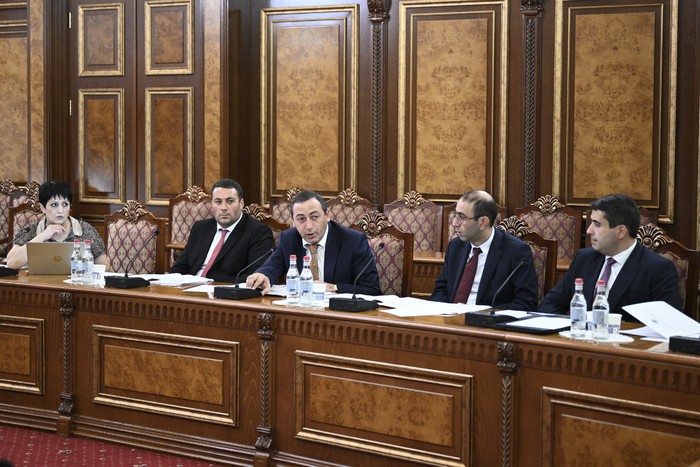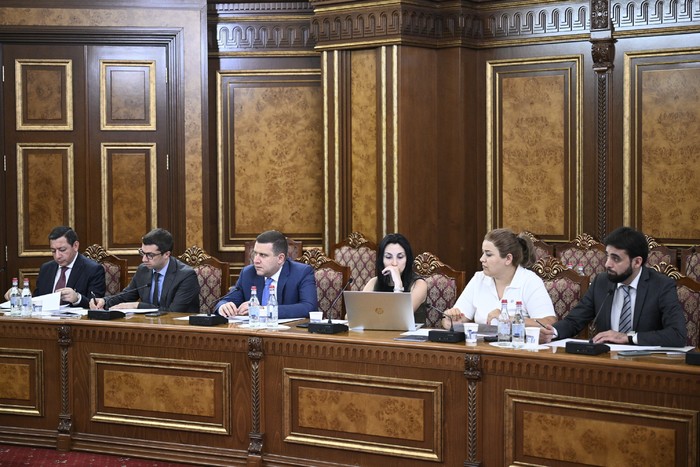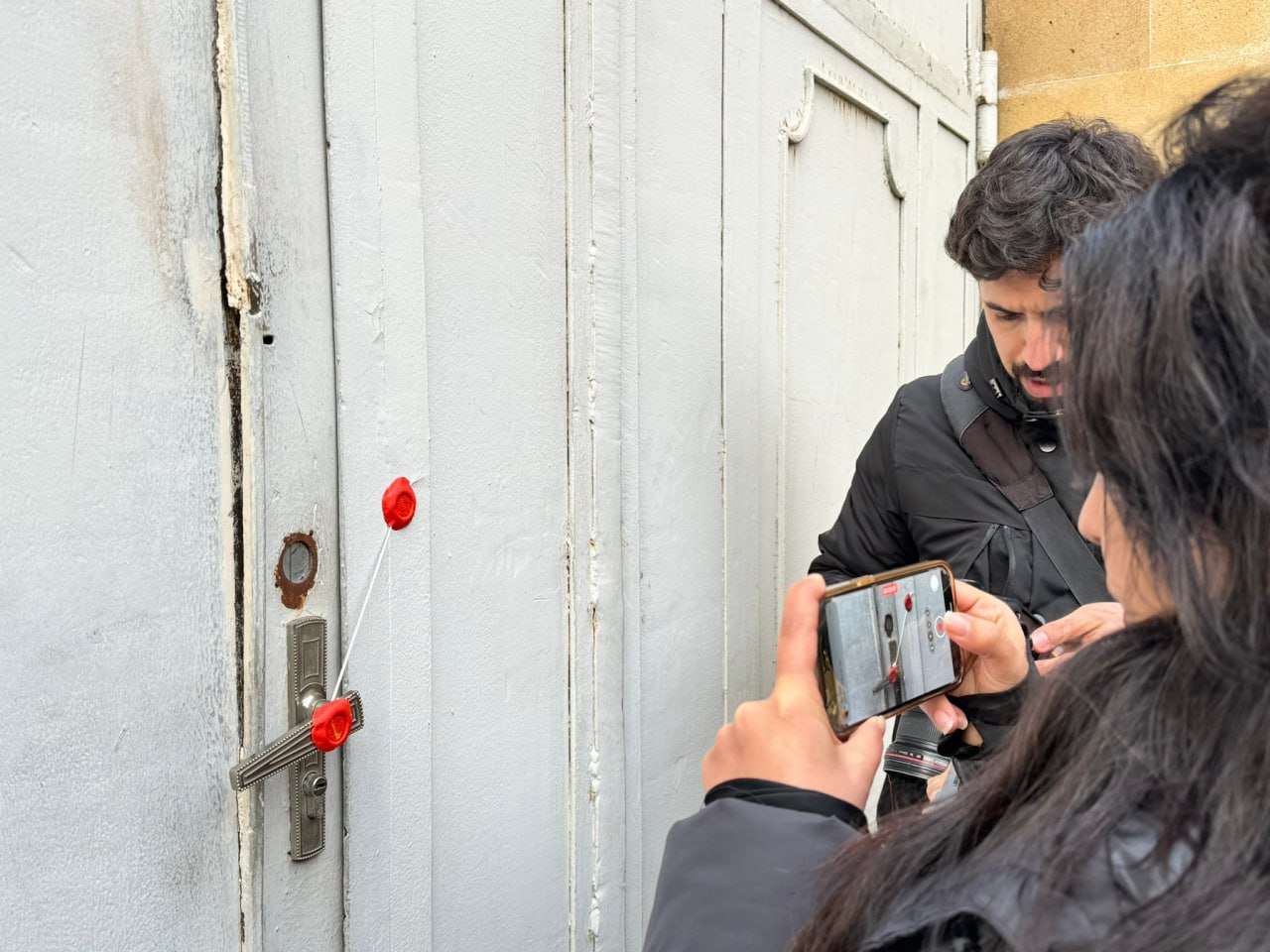Day: July 9, 2024
On July 9, chaired by Deputy Prime Minister Tigran Khachatryan, the regular meeting of the interdepartmental commission for the evaluation of subsidy applications for 2024 aimed at the development of the economic and social infrastructures of Armenian communities, in addition to the subsidies provided by the state annual budgets, was held.
During the session, 21 program subsidy applications received from the communities were discussed.
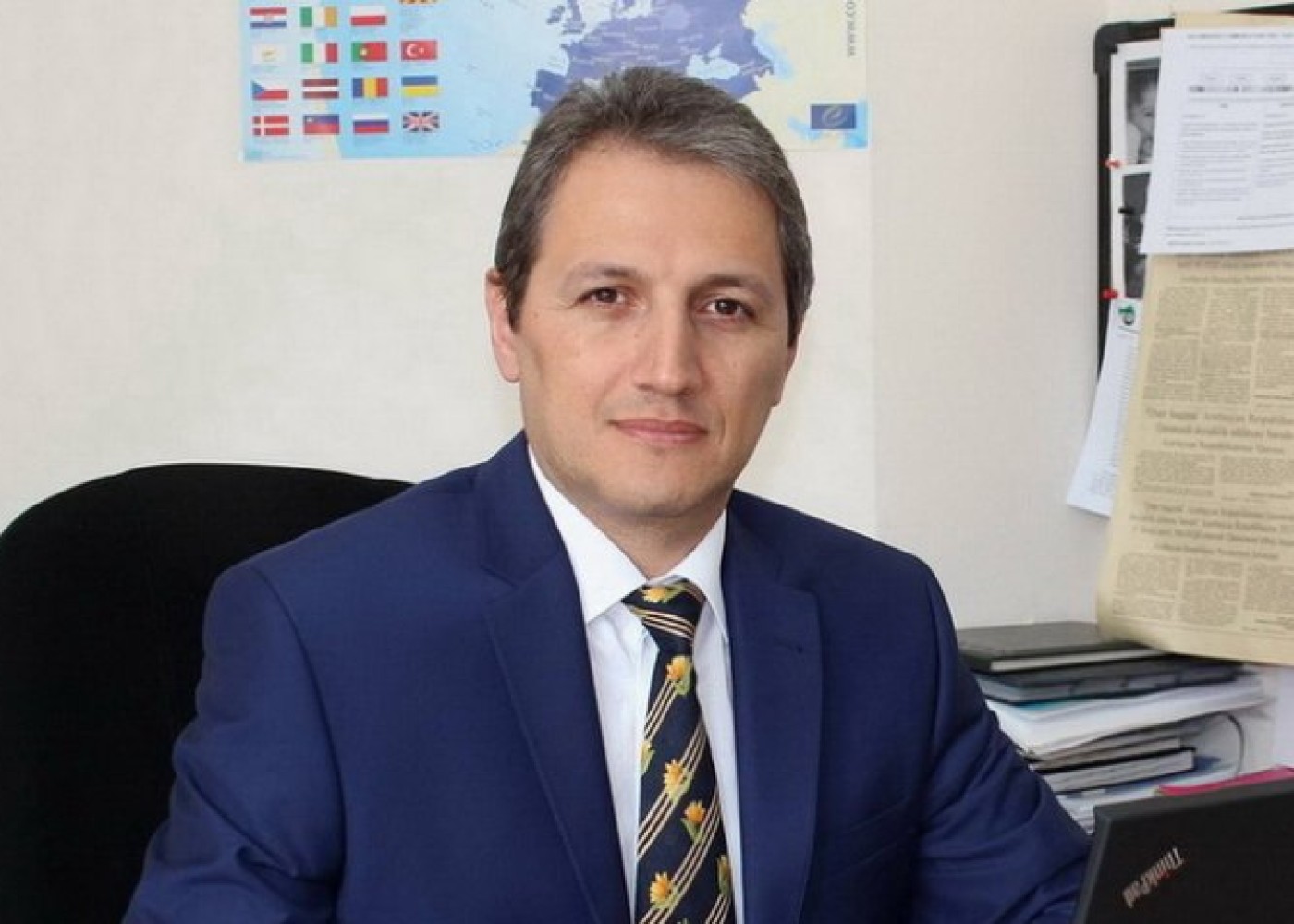
Toplum TV case – Alasgar Mammadli
The results of the analysis of biomaterial taken from the well-known media law expert Alasgar Mammadli, who has been in detention in Azerbaijan for four months in the ‘Toplum TV case,’ have been disclosed. According to the biopsy results, the tumor in his throat is benign. However, both Mammadli himself and his relatives are suspicious of the announced results.
- EU has suspended €30 million in aid to Georgia. The ambassador warned of further measures
- “This is just the beginning”: Armenia will receive 10 million euros from the European Peace Facility
- Baku expects stronger ties with Iran after new president’s election
On June 22, needle biopsy of the tumor detected in the thyroid gland was performed on the founder of the online publication Toplum TV, Alasgar Mammadli, who is currently held in Baku Pre-trial Detention Center No. 1. The procedure took place at a private clinic (West Hospital) following repeated demands from Mammadli himself, his family members, and lawyers. However, neither the family nor the lawyers were informed about the examination, and thus, no one was able to be present with him.
Later, Mammadli reported that he was not allowed to undergo examination by the doctor of his choice and that he was poorly treated during the procedure.
“In fact, law enforcement officers prevented the court’s decision on the examination from being carried out. Many police officers, prosecutors, and other law enforcement officials entered the operating room and hindered the participation of doctors requested by Alasgar and mentioned in the court decision. Since then, the reliability of the biopsy results has been questionable for us,” said Nasimi Mammadli, Alasgar Mammadli’s brother.
On July 5, Alasgar Mammadli lodged a complaint with the UN Human Rights Committee regarding this matter.
After the announcement of the biopsy results, Nasimi Mammadli told Voice of America that he spoke with his brother over the phone on July 8.
“Alasgar called from detention and informed me that the biopsy results were announced last weekend. It was reported that the detected tumor corresponds to a cystic-degenerative benign follicular nodule. While the benign nature of the tumor is good news for us, there are serious grounds to doubt the accuracy of the results.
An hour before Alasgar’s arrest, he underwent an ultrasound examination at a private clinic. At that time, a heterogeneous peripheral vascularized nodule TIRADS III measuring 23 mm was found in the left lobe of the thyroid gland (with a 50-75% probability of cancer). Additionally, other blood tests indicated the possibility of a potentially dangerous tumor. The endocrine surgeon recommended taking blood tests for 10 medical components alongside the biopsy.
However, law enforcement officials did not allow him to undergo other tests when they performed the biopsy. Therefore, the biopsy results did not satisfy Alasgar and his family. These results are insufficient for an accurate diagnosis. The endocrine surgeon also stated that there is a discrepancy between the ultrasound and biopsy results. In addition to the thyroid biopsy, he recommended immediate testing for TSH, FT4, thyroglobulin, bilirubin fractions, GGT, ALT, AST, amylase, glucose, HbA1c, creatinine, and a complete blood count. He did not rule out the need for surgical intervention,” he said.
Nasimi Mammadli reported that his brother is suffering from suffocation.
“The tumor in his throat has grown significantly. We do not consider the biopsy results reliable. Given the harsh control and cruel treatment by law enforcement, we believe that undergoing surgery under these conditions is life-threatening. It’s better to remain in isolation with pain than to undergo another humiliating examination. One of the country’s most enlightened intellectuals is illegally held in prison without guilt, evidence, or proof of wrongdoing, and he is ill. Unfortunately, there are no forces in the country that can stop this injustice,” he said.
Nasimi Mammadli added that during their phone conversation, Alasgar Mammadli’s voice was weak and tired:
“The throat tumor is causing him difficulty sleeping, he is struggling to breathe, and suffering from insomnia. The hot weather, suffocation, and constant headaches are seriously complicating his condition.”
From March 6-8, 2024, nine employees of Toplum TV and its partner organization, the Institute of Democratic Initiatives, were detained on charges of smuggling foreign currency. Seven individuals were arrested, while two were placed under police control.
Among them was Alasgar Mammadli, the founder of Toplum TV, who was apprehended by police in the courtyard of a clinic where he had gone on March 8 for an examination regarding a thyroid tumor.

On July 8, 2024, a crucial meeting took place in Rabat between the Kingdom of Morocco and the United Nations Support Mission in Libya (UNSMIL). This encounter, as highlighted by Stephanie Khoury, the acting special representative of the UN Secretary-General for Libya, resulted in a mutual commitment to continue the dialogue regarding Libya’s political process. This development marks a significant milestone in the ongoing efforts to bring stability and peace to Libya.
In a press statement following her discussions with Nasser Bourita, Morocco’s Minister of Foreign Affairs, African Cooperation, and Moroccans Living Abroad, Khoury emphasized the importance of sustaining the dialogue. “We have agreed to continue the dialogue and discuss ways to advance the political process in Libya, under the auspices of the UN, for the benefit of the Libyan people,” she stated. This commitment reflects a deep understanding of the complexities and challenges that Libya faces, and underscores the crucial roles that Morocco and the UN play in facilitating a resolution.
The meeting provided an invaluable opportunity for Khoury and Bourita to exchange views on Libya’s current difficulties and the needs of its people. Khoury underscored that advancing the political process in Libya remains a priority for UNSMIL. The discussions not only reaffirmed the necessity of ongoing dialogue but also highlighted the importance of addressing the immediate needs of the Libyan population.
Khoury’s working visit to Morocco is part of her inaugural tour of regional countries, aimed at exploring potential solutions to the Libyan political crisis. This proactive approach signifies the UN’s unwavering dedication to fostering peace and stability in Libya, while Morocco’s involvement underscores its pivotal role in regional diplomacy.
The collaboration between Morocco and the UN is not new; it builds on a history of constructive engagement and dialogue. Morocco’s strategic position and its diplomatic relations with various Libyan factions make it an indispensable player in the peace process. By continuing to support UNSMIL’s efforts, Morocco reinforces its commitment to regional stability and showcases its diplomatic acumen.
The Libyan crisis, marked by prolonged conflict and political fragmentation, requires a concerted effort from the international community. The agreement between Morocco and the UN to continue dialogue is a beacon of hope, suggesting that through persistent and open communication, a pathway to peace is possible.
The needs of the Libyan people remain at the forefront of these discussions. The country’s prolonged instability has inflicted immense suffering, and addressing these humanitarian concerns is crucial. The dialogue facilitated by Morocco and the UN aims to not only advance the political process but also to deliver tangible benefits to the Libyan populace.
The journey toward peace in Libya is undoubtedly fraught with challenges. However, the steadfast commitment of Morocco and the UN to continue dialogue represents a significant step in the right direction. It serves as a reminder that even in the face of complex political crises, diplomacy and dialogue remain powerful tools for conflict resolution.
As the international community watches, the efforts of Morocco and the UN in Libya can serve as a model for resolving similar crises worldwide. Their partnership exemplifies how regional and international cooperation can pave the way for sustainable peace and development. The world must support these efforts, recognizing that the road to peace is built on the foundations of persistent dialogue and mutual understanding.
In conclusion, the agreement between Morocco and the UN to continue their dialogue on Libya’s political process is a testament to their commitment to peace and stability. It highlights the importance of ongoing communication and the role of regional diplomacy in addressing global challenges. As these efforts progress, the hope for a stable and prosperous Libya becomes ever more attainable.

This essay aims to explore the possibility of establishing a trilateral partnership among Indonesia, India, and Brazil to address common challenges. These nations have emerged as influential global powers and have the potential to leverage their strengths to promote a more equitable global environment. The focus will be on reshaping the international order through strategic collaboration.
The changing dynamics of global power require us to reassess international alliances and partnerships. Indonesia, India, and Brazil are key actors driving these changes due to their large populations, abundant resources, robust economies, and significant geopolitical influence. By collaborating, these countries can establish a new framework for global cooperation that effectively addresses pressing issues such as economic inequality, environmental degradation, and geopolitical instability.
One area where India, Indonesia, and Brazil can collaborate is in promoting economic growth. It is important to prioritize the formation of a regional trade bloc that facilitates seamless trade by simplifying tariff structures and removing trade barriers. This trilateral agreement would encourage trade within the bloc while also strengthening their collective bargaining power on the global stage. A shared market strategy, focusing on technology, agriculture, and manufacturing, would stimulate economic growth, generate employment opportunities, and foster prosperity throughout the region. Additionally, collaboration in fintech, e-commerce, and digital infrastructure would harness the potential of technology to drive economic advancement.
Sustainable development is a crucial area where nations can exert significant influence. Joint investments in renewable energy projects, such as solar, wind, and bioenergy, would contribute to global efforts to reduce reliance on fossil fuels and combat climate change. Additionally, sharing best practices in sustainable forestry resources would help address the pressing challenge of deforestation. Collaborative endeavours in climate change mitigation, including the development of climate-resilient infrastructure and the dissemination of green technologies, would demonstrate their commitment to environmental stewardship.
Cultural exchange tourism and collaboration have significant potential in the realm of academia. Cultural exchange programs play a key role in promoting mutual understanding and strengthening cultural bonds, fostering a sense of solidarity among nations. Efforts such as visa-free travel agreements and coordinated marketing campaigns can simultaneously boost tourism revenue and create new avenues for economic engagement. Consequently, cultural tourism and cooperation can contribute to enhancing the global image of Indonesia, India, and Brazil as vibrant and hospitable destinations.
In the field of agriculture, collaboration plays a crucial role in ensuring food security and advancing sustainable practices. By sharing best practices in sustainable agriculture, with a focus on supporting smallholder farmers and preventing deforestation, these countries can improve agricultural productivity and sustainability. Moreover, collaborative research aimed at enhancing crop quality and resilience to climate change can further strengthen their respective agricultural sectors, thus securing a stable food supply for their growing populations.
Partnerships in education and research act as catalysts for innovation and knowledge sharing. Establishing research consortia for joint projects in areas such as healthcare and environmental sciences enables the pooling of intellectual resources, expediting technological advancements. Additionally, fostering exchange student programs and providing scholarships can foster educational cooperation while nurturing a new generation of leaders equipped with a global perspective.
Geopolitical and cooperative security are of utmost importance in maintaining regional stability and effectively confronting shared threats. By establishing a trilateral security framework that focuses on issues such as terrorism, piracy, and cyber threats, collective security can be strengthened among these countries. Collaborative peacekeeping and humanitarian initiatives capitalize on the global influence of these nations, contributing to international peace and stability.
Another promising avenue for collaboration lies in the field of biotechnology in healthcare. By sharing expertise and resources, countries can enhance their public health systems and strengthen their ability to combat pandemics. Joint investments in biotechnology research and development hold the potential to drive innovative breakthroughs in sectors such as agriculture, medicine, and environmental sustainability, thus addressing some of the most pressing challenges of our time. Technological innovation and the development of digital infrastructure are essential prerequisites for achieving economic modernization and fostering global competitiveness.
To position themselves at the forefront of the ongoing digital revolution, nations must establish joint innovation hubs dedicated to promoting advancements in key areas such as artificial intelligence, the Internet of Things, and clean technology. By doing so, they can substantially enhance their capacity for technological progress. Additionally, collaborative digital infrastructure projects hold the potential to ensure the equitable distribution of technology, bridging the existing digital divide and cultivating inclusive growth. Infrastructure development represents a particularly significant domain in which India, Indonesia, and Brazil can engage in joint efforts aimed at bolstering connectivity and promoting economic integration. By investing substantially in projects such as transport networks, ports, and smart cities, these nations can effectively bolster regional connectivity, subsequently supporting overall economic growth. Encouraging public-private partnerships will further facilitate the involvement of private sector expertise and investment, thus ensuring the successful implementation of these infrastructure initiatives.
The role of international diplomacy and multilateralism is crucial for enhancing global influence. Nations can effectively advocate for their collective interests and champion tailored reforms for the specific requirements of developing nations by presenting a unified and cohesive approach in international arenas such as the United Nations, G20, and World Trade Organization. Furthermore, by actively promoting South-South cooperation, greater collaboration among developing countries can be facilitated, offering alternative development models that align more closely with the socio-economic realities of these regions.
In conclusion, the strategic collaboration between India, Indonesia, Brazil, and harbours immense potential for reshaping the global order. By prioritising various key areas such as economic growth, sustainable development, cultural exchange, education, agriculture, geopolitical stability, healthcare, technological innovation, development infrastructure, and international diplomatic relations, these nations can collectively address the challenges that lie ahead and make substantial contributions to a more inclusive and prosperous world. It is important to highlight that this trilateral partnership not only benefits their respective populations but also supports global peace, stability, and sustainable development.
The opinions expressed in this article are the author’s own.
References
- Bhat, Rajesh, and Priyanka Rawat. “India’s Role in the Global Economy.” Journal of International Economic Studies, vol. 12, no. 3, 2022, pp. 345-367.
- Costa, Mariana. “Brazil’s Environmental Policies and Global Climate Change.” Environmental Science & Policy, vol. 16, no. 2, 2021, pp. 189-210.
- Pranata, Agus. “Indonesia’s Economic Development and Trade Relations.” Asia-Pacific Economic Review, vol. 14, no. 1, 2023, pp. 123-145.
- Sen, Amartya. “The Prospects of South-South Cooperation.” Development Policy Review, vol. 18, no. 4, 2020, pp. 511-533.
- Verghese, B. G. “India, Brazil, and Indonesia: Emerging Powers in a Changing World.” Global Governance Review, vol. 10, no. 4, 2022, pp. 278-295.
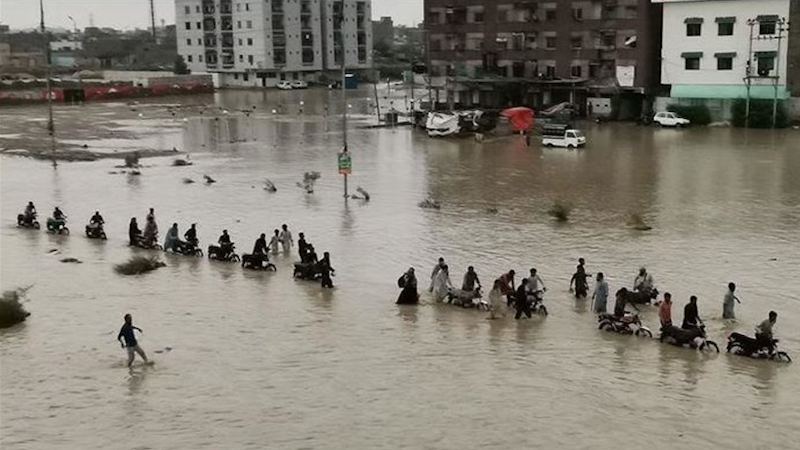
Climate Change has become one of the most prominent issues humanity is facing. The world is seeing an increase in temperatures and weather related disasters, greatly endangering human lives. However, some nations are seeing its effects more vividly than others. Pakistan is one such country.
Pakistan is one of the most vulnerable countries to climate change. There has been a marked increase of droughts, temperatures and erratic weather events in the country. An ideal example is that of the 2022 flooding in Pakistan which resulted in over $15 billion of economic loss to the country. Coupled with this, the country is seeing an increase in droughts and erratic and extreme weather abnormalities which has heavily affected the agriculture sector leading to crop loss and increasing economic, food and water insecurity.
Many suggest that the solution for this is for Pakistan to switch to renewable resources and “go green”. While that is a wise direction for the country to move towards from an economic standpoint, seeing as how the world is seeing a shift towards the renewable industry, it makes little sense as a solution for Pakistan against climate change and its effects. Pakistan is one of the lowest contributors to climate change. Pakistan’s global Greenhouse Gas (GHG) emission amounted to 0.9% of global GHG emissions according to a report by the United Nations Framework Convention on Climate Change (UNFCCC). This data can allow us to reasonably assume that Pakistan is not at fault for climate change and how it is devastating the country and therefore should not be held accountable and made to act alone in its mitigation.
The majority of responsibility lies with developed nations of the Global North such as the United States and European countries which contributed to around 50% of GHG emissions globally due to their rapid industrialization. This proportionate responsibility argument raised by many nations such as Pakistan has led to the formulation of the idea of loss and damages. Loss and Damages refers to the irreversible damage caused by climate change to nations. One such example is the one given above of the 2022 floodings and the $15 billion of loss and damage. This loss is expected to be compensated by the nations who have been majorly responsible for climate change i.e, the developed nations. Through efforts and protests of many nations a loss and damages fund was agreed upon globally during the Conference of Parties (Cop 27) in 2022.
While this is a momentous step in holding the developed world accountable, I believe that this fund still is not the solution to solving Pakistan’s climate change issues. Pakistan suffers from political instability and this has led to various governance issues when it comes to implementing policies. The lack of transparency and accountability means that there is no guarantee that even if Pakistan does get loss and damages funds, it will be able to use them effectively. Going off of previous data, it is much more likely that those funds will end up being misused or be used in ineffective policies.
Climate change mitigation is a term that indicates reducing global carbon emissions to reduce and stop the effects of climate change. Pakistan as a negligent contributor to climate change does not need to focus on mitigation as it will have little effect on reducing the impacts of climate change in the country. What Pakistan requires is Climate Change Adaptation. Pakistan requires the means and technology to adapt to the erratic and changing weather conditions such as anti-flood technologies, advanced agricultural techniques to tackle water scarcity etc. This adaptation is impossible to achieve for Pakistan on its own. Thus Pakistan must implore foreign aid to arrive not in the form of dollars, but in forms of infrastructure as well as technology transfer to allow them the means of evolving with the rapidly changing climate.
If Pakistan can gain access to adaptation technology as well as increase their own means of building such infrastructure, the nation could very well find a long-term solution to their growing resource insecurity and move towards a path of stability.

